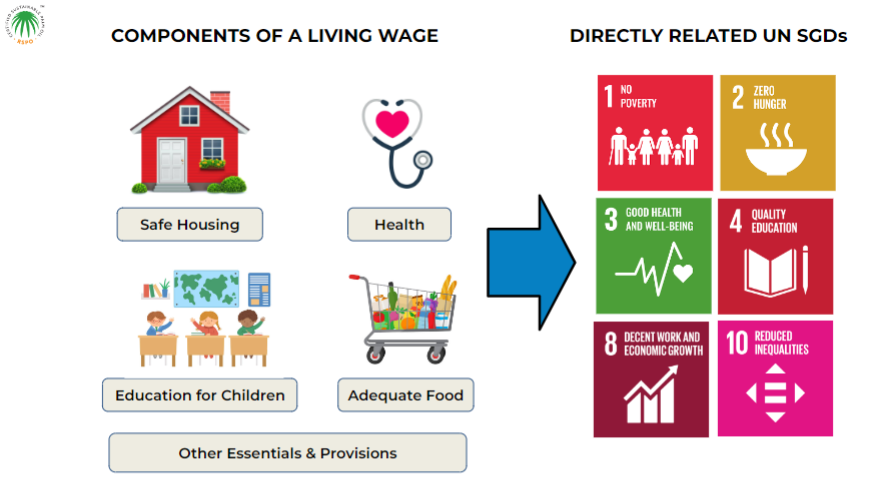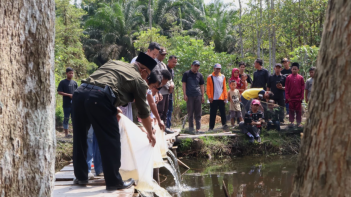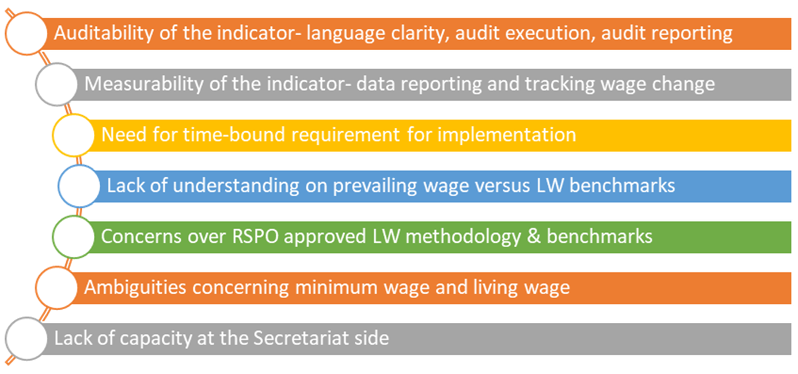A Living Wage is an effective catalyst for achieving many of the 2030 United Nations (UN) Sustainable Development Goals (SDGs) at once. Most workers, especially in agricultural value chains, have few options for a sustainable way of life as they are often unable to earn a living from it. A Living Wage addresses this issue by providing workers and their families with the means to not only meet their vital needs but also to provide them with modest security to extricate themselves from poverty.

Furthermore, a Living Wage contributes to prosperity and business as it boosts workers’ morale and stability which can translate into higher productivity, improved production process and reduced production costs. At the same time, implementing a Living Wage policy enhances the market position, brand value and value chain resilience in the global market where there is a growing push towards sustainable practices. This is without mentioning any potential impact on the domestic economy of producing countries.
The RSPO was one of the first sustainable agriculture production certification schemes to recognise this, with the first iteration of the RSPO Principles and Criteria (published in 2007) already including a requirement for “decent living wage”. This was updated in 2018, when the RSPO made the requirement more expansive, with indicator 6.2.6 stating that, “A DLW [Decent Living Wage] is paid to all workers, including those on piece rate / quotas, for whom calculation is based on achievable quotas during regular working hours.” Furthermore, the RSPO has recently aligned the terminology from ‘Decent Living Wage’ to ‘Living Wage’ to ensure consistency of terminology used globally.
ROADBLOCKS TO A LIVING WAGE
Since the clarification of indicator 6.2.6 in the 2018 RSPO Principles and Criteria (P&C), it has become clear that more guidance is needed to ensure implementation is effective across all countries and regions where RSPO certification is adopted. It requires careful consideration and an approach that involves stakeholders and actors from each step of the supply chain for effective implementation. In a recent move, the RSPO has revised its strategic direction to take into account the challenges faced and progress made by members in the journey toward implementing a Living Wage.
Together with the Living Wage Task Force, the RSPO Human Rights and Social Standards (HRSS) Unit has identified seven challenges:
Commenting on this, Perpetua George, co-chair of the Living Wage Task Force said, “I think it is important to recognise that with the 2018 Principles and Criteria clarification on Decent Living Wage (now Living Wage), there needs to be more consolidated effort on being able to prove that RSPO certified companies are indeed paying a Living Wage. Because the oil palm plantation sector provides substantial in-kind contributions, including big ticket items such as housing, medical costs for employees and dependents, (and in some jurisdictions) the equivalent of private or international education for children of workers – it could well be that the current prevailing wage being paid – whether this is at minimum wage or above that – is already meeting the Living Wage. The key is that we in the sector, as responsible oil palm producing companies, must be able to prove in a fair way that the industry does indeed support and pay Living Wages. Clearly, where more work is needed, we need the RSPO to support this process through the National Interpretation Working Groups.”
To address these challenges, the RSPO recognises a need for capacity building not only in the organisation but amongst its members; improvements in the audibility of the RSPO Standards and audit process; and a system for monitoring progress. With this in mind, a revised Living Wage Strategy has been developed, providing sufficient attention to learning and capacity building. The RSPO Living Wage Strategy was endorsed by the Living Wage Task Force and RSPO Standards Standing Committee on 3 March 2023.
STEPWISE APPROACH
In an effort to create a level playing field and more inclusive model for Living Wage implementation, the RSPO has a stepwise approach. Each step of the Living Wage trajectory has assigned milestones and outcomes towards achieving Living Wage payment to all workers in the sustainable palm oil sector.
LIVING WAGE TRAJECTORY
- Step One: Standardised prevailing wage calculation and wage data collection system;
- Step Two: Living Wage benchmarks and identification of Living Wage gaps; and
- Step Three: Verification and closing living wage gaps.
Taking into consideration the identified challenges, the RSPO HRSS Unit and the Living Wage Task Force have decided a pragmatic approach is to start by improving the prevailing wage calculations and developing a wage reporting system. It is particularly important to increase clarity on what constitutes prevailing wage and its calculation or valuation while ensuring regular improvement of prevailing wage. This is essential to tracking progress of wages over time and strengthening members’ capacity through the development of procedures, tools, or supporting documents.
Margaret Chin, co-chair of the Living Wage Task Force says “The Living Wage has been a long time in the making. With this Stepwise Approach, we are on another phase of the journey and we hope to eventually see the realisation of efforts being put in by all relevant stakeholders to achieve the implementation of Living Wage. We are only as fast as the slowest and thus this approach entails that we hold each other’s hands to achieve the goal.”
On this basis, the RSPO has decided to postpone activities related to Living Wage benchmarks until Step One is complete. Thereafter, the strategy will focus on researching Living Wage methodologies and benchmarks; commissioning and developing benchmarks for RSPO members; processes for Living Wage gap verification; and strategies towards addressing these gaps.
“Achieving a Living Wage is an important element of RSPO’s vision of a prosperous and sustainable future for all. In this complex endeavour, the stepwise approach at the core of our revised strategy will provide an inclusive implementation model for both those initiating and those already adopting a Living Wage in their supply chains or operations”, says Joseph D’Cruz, CEO, Roundtable on Sustainable Palm Oil. Some members are already in a position to implement a Living Wage beyond Step One, and with the support of the RSPO, can move ahead helping to model best practice and sharing learnings for Living Wage implementation. Members are encouraged to contact RSPO for further information and support. Similarly, members who wish to use Global Living Wage Coalition (GLWC) benchmarks, may refer to the benchmarks as they are already approved by the RSPO. In the event that there is no GLWC benchmark for their location, members (individually or in groups) can commission GLWC benchmarks for their specific locations by directly contacting the GLWC.
Finally, in developing this Living Wage strategy, the HRSS Unit has considered the feedback from the ongoing 2023 RSPO Standards review process. The Living Wage Strategy is subject to review if significant changes are introduced in the final outcome of the 2023 Standards Review.
If you have any questions, please contact the HRSS Unit at [email protected].
1 Barford, A., Gilbert, R., Beales, A., Zorila, M., & Nelson, J. 2022. The case for living wages: How paying living wages improves business performance and tackles poverty. Business Fights Poverty, University of Cambridge Institute for Sustainability Leadership & Shift. DOI: 10.17863/CAM.80370 URLs: https://businessfightspoverty.org/ register-the-case-for-living-wages/ and https://www.cisl.cam.ac.uk/resources/ publications/case-for-living-wages
Keep reading

Rowo Ombo: From Neglected Swamp to a Symbol of Hope and Conservation in Jambi, Indonesia

Save the Date: The 22nd General Assembly (GA22) of RSPO Members

Access into prisma

10 Years of RSPO in China: Driving Palm Oil Transformation Towards Sustainability

Updated Trace Function in prisma

Call for Expression of Interest: Independent Investigation of a Complaint

Latin American Smallholders, Key Global Brands Gather in Peruvian Amazon to Advance Sustainable Palm Oil

RSPO Forum for Members and Certification Bodies 2025: Strengthening Capacities and Building Bridges with RSPO Members





